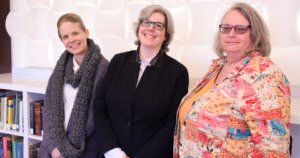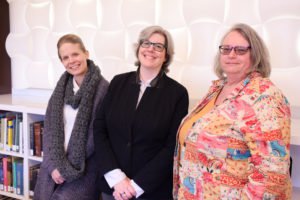SU Publishes Wordgathering, a Digital Open Access Journal of Work from Disabled Writers

Syracuse University’s Burton Blatt Institute (BBI) and Syracuse University Libraries will be assuming publication in December 2019 of the digital open access journal and website, Wordgathering: A Journal of Disability Poetry and Literature. Diane R. Wiener, Research Professor and Associate Director of BBI’s Office of Interdisciplinary Programs and Outreach, will take over as Editor-in-Chief from Wordgathering’s founder and long-time editor, Michael Northen. Further support and advisement will come from Syracuse University colleagues Rachael Zubal-Ruggieri, Administrative Assistant of BBI’s Office of Interdisciplinary Programs and Outreach; Amanda Page, Open Publishing and Copyright Librarian at Syracuse University Libraries; and Kate Deibel, Inclusion and Accessibility Librarian at Syracuse University Libraries. As part of this transition, the journal will be made fully Open Access over the course of the next several issues. Assuming responsibility of open access publication of Wordgathering aligns with the University’s goal of providing shared competency opportunities for students around ethics, integrity, and commitment to diversity and inclusion.

From left to right, new Wordgathering publication team: Amanda Page, Open Publishing and Copyright Librarian at Syracuse University Libraries; Diane R. Wiener, Research Professor and Associate Director of BBI’s Office of Interdisciplinary Programs and Outreach; Rachael Zubal-Ruggieri, Administrative Assistant of BBI’s Office of Interdisciplinary Programs and Outreach (missing from photo: Kate Deibel, Inclusion and Accessibility Librarian at Syracuse University Libraries)
“As we celebrate disability awareness and appreciation month and open access week in October, it’s fitting that we celebrate this Wordgathering transition too,” said Diane Wiener. “Syracuse University Libraries’ Open Publishing Services supports publication of several journals, including Ergo, Excelsior, and Public. Adding Wordgathering to this portfolio is a natural extension,” said Amanda Page.
In an interview conducted by Professor Jim Ferris (Ability Center Endowed Chair in Disability Studies at the University of Toledo), the members of the Wordgathering transition team share additional details and background around the transition. Wordgathering was originally published in March 2007 to showcase the work of disabled poets. Later, audio versions were added to accompany the poems in text copy, enhance accessibility and increase readers’ aesthetic experience. The journal evolved to include poetry, essays, book reviews, interviews, fiction, art, excerpts, and other work from contributors with myriad disabilities, as well as work by nondisabled people. The journal provides diverse, cross-disability perspectives.
According to the current editor of Wordgathering, Michael Northen, “…Books by poets who actually wrote about their own disabilities in poetry prior to 2000, could literally be counted on one hand…for the first time [with the publishing of Wordgathering], the poets in my group saw their own lives reflected in the poetry they read.” Dr. Kate Deibel notes “Technology has certainly opened up opportunities for disabled creators to contribute their works. I’ll be working to ensure that can continue with Wordgathering, as well as ensuring that people of all abilities can read the content in the journal.”
Northen goes on to say that the transition of publication to Syracuse University will enable “the marvelous archive of disability writing published in Wordgathering over the past thirteen years [to] be preserved and accessible to any interested readers or researchers…[and] the available resources that Syracuse University has to offer. The journal, under Diane’s direction, and with advisement, sponsorship, and support from Syracuse University Libraries, the Burton Blatt Institute and others, will be able to expand and develop in directions that have not been possible up to this point.”
According to Wiener, “In thinking of disability arts and literature as facets of cultural diplomacy and communication, broadly, Wordgathering is well-situated…to engage actively in and be among the leaders of an ever-expansive discussion and demonstration of Disability, Deaf, Neurodivergent (including Autistic), Mad, and Crip poetics, in the world today.”
